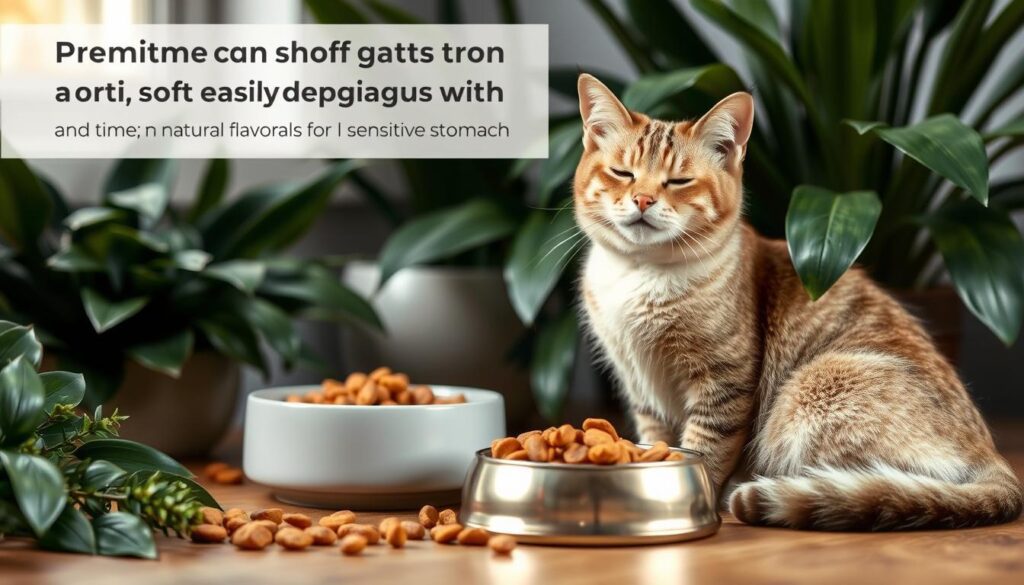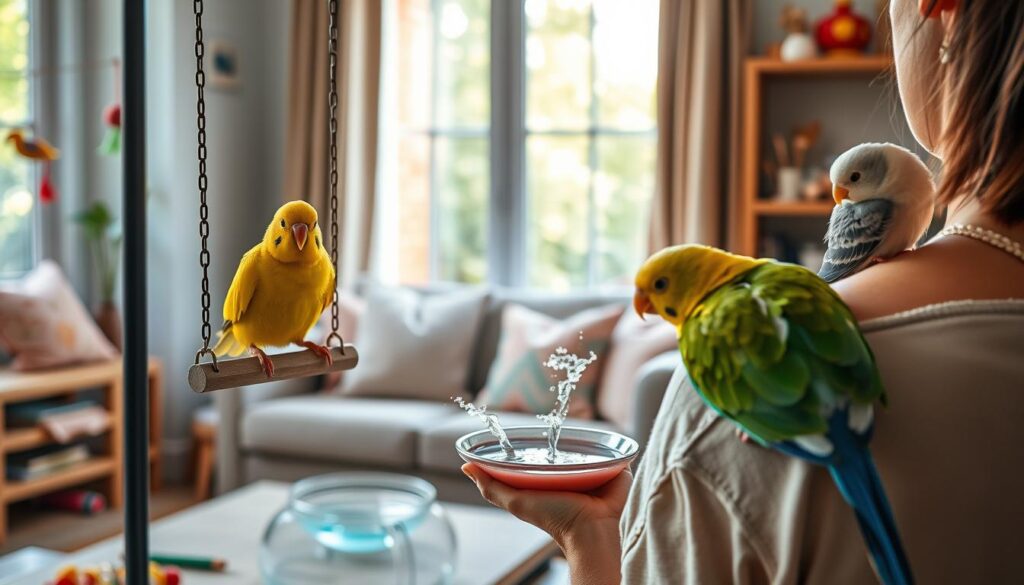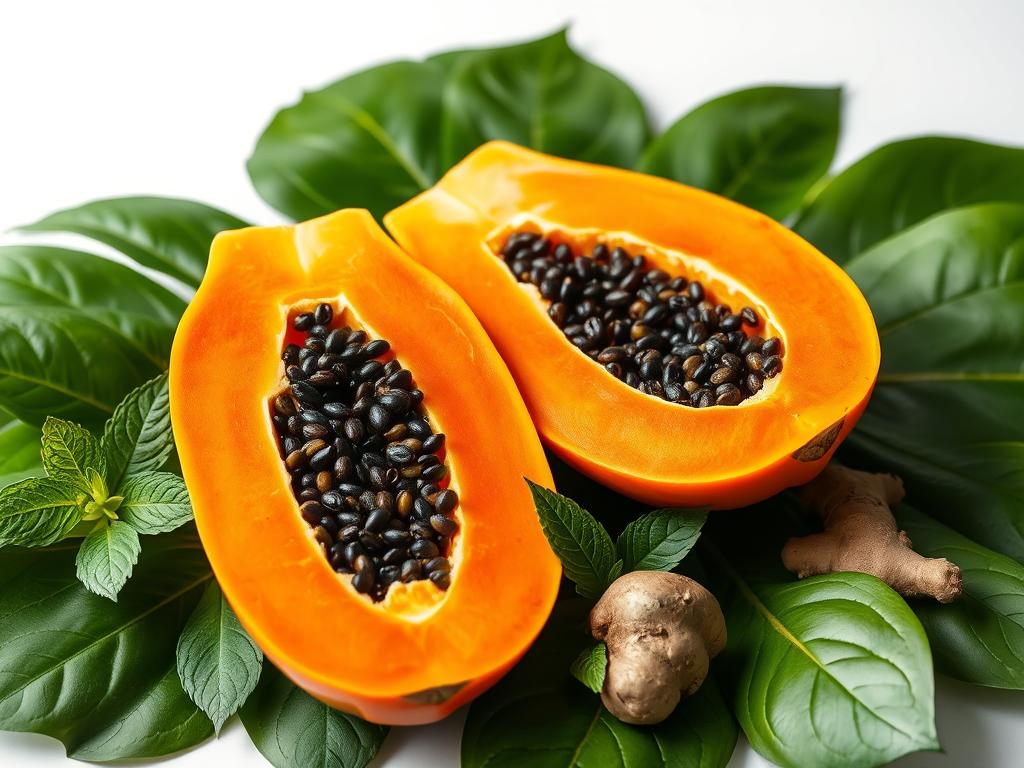Imagine watching your beloved feline friend nibble their food with enthusiasm only to later find them curled up, obviously uncomfortable. This scenario resonates with many cat owners dealing with the delicate issue of sensitive stomachs in their pets. As they try different brands and flavors in pursuit of a solution, the search for the best cat food for sensitive stomachs becomes a priority.
Just like humans, our furry companions can face digestive distress, leading to discomfort that affects their overall well-being. Choosing the right, stomach-friendly cat food is essential for promoting feline digestive health and ensuring their happiness. In this article, we’ll explore why sensitive digestion is a common predicament and how proper nutritional choices can make all the difference.
As we embark on this journey to better understand and care for our cats, we will discuss the signs to look for, ingredients that provide comfort, and top product recommendations. With the right information, you can help your furry friend flourish and enjoy each meal without the added worry of digestive issues.
Key Takeaways
- Understanding the signs of sensitive stomachs is crucial for prompt support.
- High-quality protein and limited ingredients are key for sensitive stomach cat food.
- Top brands like Royal Canin and Hill’s offer specialized formulations.
- Wet food options provide increased moisture and digestibility benefits.
- Transitioning to new food should always be gradual to avoid upsetting your cat’s stomach.
Understanding Sensitive Stomachs in Cats
Cats can experience a range of stomach sensitivities, which can manifest through various signs that may require sensitive stomach cat food. Recognizing these signs early can help ensure better health and comfort for your feline friend. Common symptoms associated with cat digestive distress include vomiting, diarrhea, lack of appetite, weight loss, and excessive gas. Turning to sensitive stomach cat food can alleviate these issues while providing essential nutrition. Additionally, observing behaviors such as licking their lips, lethargy, or noticeable bloating can serve as important indicators that your cat might benefit from a diet focused on sensitive stomach cat food.
Common Signs of Digestive Distress
Watch for any cat digestive distress symptoms that may arise. Vomiting once in a while may be normal, but frequent occurrences—especially when paired with other symptoms—warrant attention. A sudden decrease in appetite or unusual weight loss should prompt concern. Furthermore, excessive gas production can lead to discomfort and should be monitored closely.
Causes of Sensitive Stomachs in Cats
The causes of sensitive stomachs in cats can vary widely. Commonly, dietary intolerances or allergies, particularly to ingredients in commercial cat food, are major culprits. Cats can develop cat food allergies to proteins such as beef or chicken. Additionally, underlying medical conditions such as inflammatory bowel disease, parasites, and bacterial infections can elevate the risk of gastrointestinal issues. Environmental stress factors, like moving to a new home or loud noises, may further exacerbate these sensitivities.
When to Consult a Veterinarian
If your cat displays persistent digestive issues—like frequent vomiting or diarrhea—it’s crucial to consult a veterinarian for cat digestive issues. They can pinpoint the root cause and suggest appropriate treatments or dietary adjustments. Diagnostic tests, dietary trials, and options for hypoallergenic diets may be recommended to manage your cat’s condition effectively.
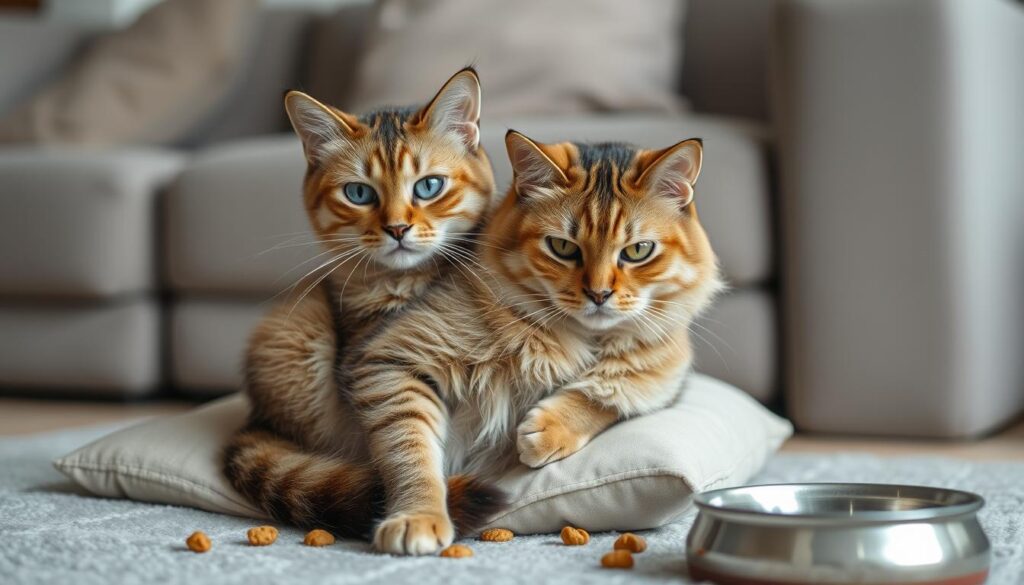
Key Ingredients in Sensitive Stomach Cat Food
Choosing the right cat food can make a world of difference for felines with delicate digestive systems. A focus on specific ingredients ensures comfort and well-being. Understanding the key components of sensitive stomach cat food can aid in selecting the best diet for your cat.
Benefits of High-Quality Proteins
High-quality proteins for sensitive stomachs are essential in promoting feline digestive health. These proteins, often sourced from chicken, turkey, and fish, provide necessary nutrients without causing gastrointestinal distress. Foods designed specifically for sensitive stomachs prioritize these proteins, ensuring they are easily digestible. Cats thrive on a diet rich in animal proteins, which not only supports their overall health but can also alleviate digestive issues.
Importance of Digestive Aids
Incorporating digestive aids in sensitive stomach cat food is another crucial element for feline health. Ingredients such as probiotics and prebiotic fibers play significant roles in promoting digestive health, especially in sensitive stomach cat food formulations. These components help maintain a balanced gut flora, making nutrient absorption more efficient while minimizing discomfort during digestion. Conditions like irritable bowel syndrome can often be mitigated with proper dietary choices, highlighting the importance of selecting sensitive stomach cat food that includes these beneficial aids.
Role of Limited Ingredients
Limited ingredient cat food can be particularly beneficial for cats with sensitive stomachs. By reducing the number of ingredients, pet owners can easily identify and eliminate potential allergens from their feline’s diet. These specialized diets often lead to improved stool quality and overall gastrointestinal comfort. When selecting food, look for the best cat food ingredients, focusing on those that ensure your cat can digest their meals without stress.
Exploring options like KOHA Limited Ingredient Cat Food or Merrick Purrfect Bistro can provide tailored nutrition for cats facing digestive challenges. Each provides a range of palatable and easy-to-digest recipes, making mealtime both enjoyable and health-focused. Understanding the best cat food options empowers pet owners to make informed decisions for their furry friends.
Top Brands for Sensitive Stomach Cat Food
Choosing the right food for a cat with a sensitive stomach can significantly impact their health and well-being. Several brands have earned their place among the best options available, focusing on ease of digestion and nutritional balance. These top-rated cat food brands, including Hill’s Science Diet sensitive stomach, Royal Canin sensitive stomach cat food, and Wellness CORE cat food for sensitive stomachs, are designed to address the unique needs of cats requiring gentle diets.
Hill’s Science Diet
Hill’s Science Diet offers a variety of options catering specifically to cats with digestive sensitivities. Their formulations, such as the sensitive stomach and skin recipes, feature easily digestible proteins and high-quality fiber sources. This vet recommended cat food supports overall digestive health while ensuring that cats receive essential nutrients. Many pet owners appreciate these products for their effectiveness in alleviating discomfort and promoting a healthier digestive system.
Royal Canin
Renowned for its targeted nutrition, Royal Canin provides specialized formulas for cats with sensitive stomachs. Their Royal Canin sensitive stomach cat food incorporates a unique blend of nutrients and fiber that aids in digestion. Notable products include Royal Canin Digestive Care Thin Slices in Gravy, designed to reduce digestive distress and support optimal nutrient absorption. This brand is often a go-to for those looking to ease their cats’ digestive troubles.
Wellness CORE
Wellness CORE features grain-free recipes that emphasize high protein and limited ingredients, targeting sensitive digestion. Their formulations, recognized as hypoallergenic cat food, cater to the specific dietary requirements of felines needing a gentle approach. Wellness CORE cat food for sensitive stomachs provides all the necessary nutrients while being mindful of potential allergens, making it a popular choice among pet owners seeking a reliable option for their cats.
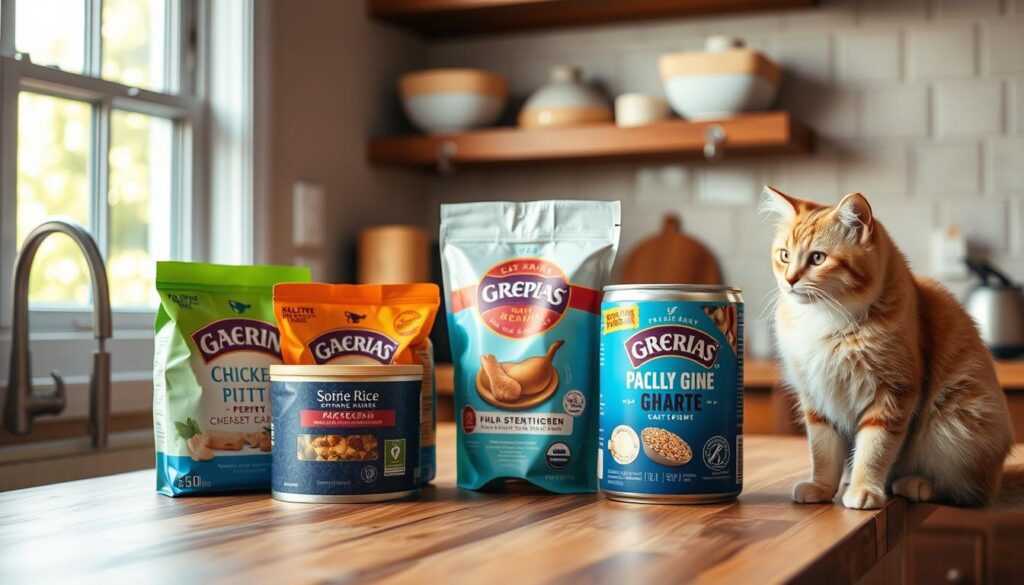
Nutritional Considerations for Sensitive Digestive Systems
Choosing the right cat food is crucial for those with sensitive stomachs. The appropriate nutrition can significantly impact a cat’s overall digestive health. Key factors to consider include fiber content, moisture levels, and the elimination of unnecessary ingredients.
Ideal Fiber Content
The ideal fiber content for cat digestive health usually ranges from 1% to 8%. Fiber plays a vital role in maintaining regularity and promoting a healthy digestive system. Both soluble and insoluble fibers contribute to better gut health, helping to manage common issues like diarrhea. A balanced fiber intake can lead to significant improvements in digestion for cats experiencing distress.
Importance of Moisture in Diet
Moisture in cat food is essential, especially for cats with sensitive stomachs. Wet cat food typically offers higher moisture levels, aiding in hydration for sensitive stomachs. Hydration is crucial for preventing problems like constipation and urinary tract issues. Cats often prefer wet food due to its palatability and softer texture, making it easier for them to digest.
Avoiding Fillers and Artificial Additives
When selecting cat food, it is vital to avoid fillers in cat food and artificial additives in cat food. Ingredients such as corn, soy, or by-products can lead to digestive discomfort and may provide little nutritional value. Opting for clean, simple formulations without unnecessary additives can enhance a cat’s digestive health and overall well-being.
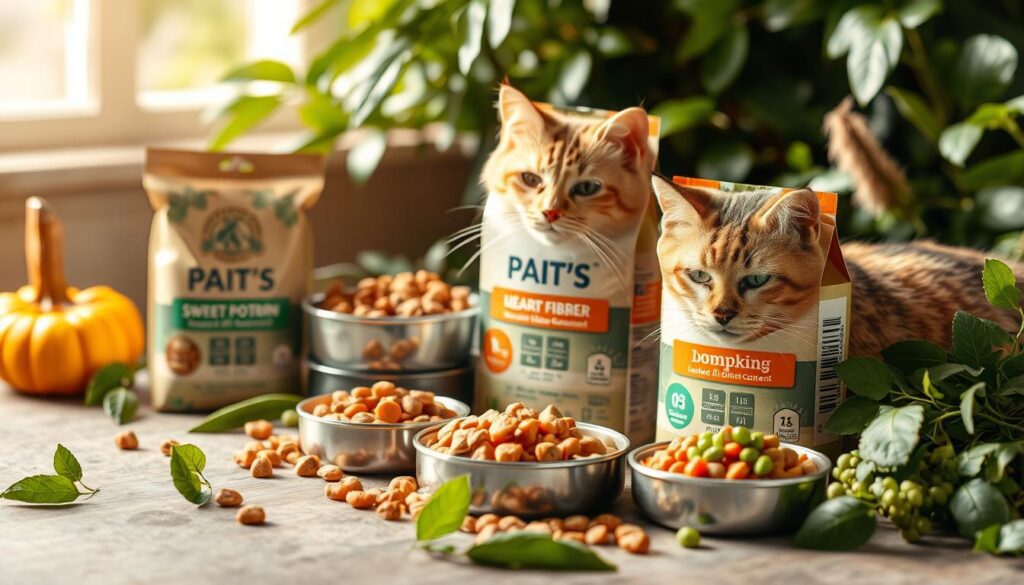
Tips for Transitioning to New Cat Food
Transitioning cat food effectively can make a significant difference for cats with sensitive stomachs. A careful, gradual introduction is essential to minimize the risk of digestive upset. This process ideally spans 7 to 10 days, allowing your feline friend to adjust comfortably to the new diet while minimizing stress on their digestive system.
Gradual Introduction Process
Implementing a gradual introduction for sensitive stomachs involves slowly increasing the percentage of new food while decreasing the old food. Start by mixing a small amount of the new food into their current diet, gradually increasing the portion of the new food over several days. This method helps prevent gastrointestinal issues such as vomiting or diarrhea, which can occur with sudden dietary changes.
Monitoring Your Cat’s Response
During the transition, it is vital to monitor cat food transition closely. Pay attention to changes in appetite, stool consistency, and any signs of discomfort. If your cat shows signs of distress, consider slowing down the transition process. Observing your cat’s behavior provides insights into how well they are adapting to the new food, aiding in any necessary adjustments.
Adjusting Portions According to Dietary Needs
Adjusting cat food portions to meet specific dietary needs for sensitive stomachs is important for overall health and wellness. Cats with sensitive digestion may require smaller, more frequent meals to ease their digestion. Consulting with a veterinarian can help determine appropriate serving sizes for the new food. Remember, ensuring that your cat receives the right amount of nutrition is essential for their well-being.
Frequently Asked Questions (FAQs)
Identifying sensitive stomach in cats can be challenging but essential for their health. Common signs include frequent vomiting, diarrhea, lack of appetite, and excessive gas. Observing these symptoms encourages prompt attention, allowing for timely dietary adjustments that can alleviate discomfort and improve overall well-being.
How do I know if my cat has a sensitive stomach?
Symptoms such as vomiting or diarrhea can indicate that your cat has a sensitive stomach. In addition to these, owners should look out for changes in appetite and increased gas. If you notice these signs consistently, it’s important to consult a veterinarian for guidance on identifying sensitive stomach in cats and to explore suitable dietary solutions.
What should I avoid in cat food for sensitive stomachs?
When selecting cat food for sensitive stomachs, it’s crucial to avoid certain ingredients that may lead to digestive distress. Foods containing common allergens, fillers like corn and soy, and artificial colors or preservatives should be eliminated from your cat’s diet. Choosing specialized sensitive stomach cat food allows you to avoid these irritants and promote a healthier digestive system.
Can sensitive stomach cat food help with allergies?
Yes, sensitive stomach cat food can be beneficial for managing allergies. These specialized diets, often considered among the best cat food options, feature limited ingredient formulations that reduce the likelihood of reactions and help control symptoms related to sensitivities. Choosing the best cat food for a sensitive stomach not only supports your cat’s overall health but also ensures they receive proper nutrition without triggering allergies. Consulting with a veterinarian is recommended to determine the most effective sensitive stomach best cat food for allergies that aligns with your cat’s specific needs.

